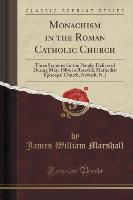- Start
- Monachism in the Roman Catholic Church
Monachism in the Roman Catholic Church
Angebote / Angebote:
Excerpt from Monachism in the Roman Catholic Church: Three Sermons for the People, Delivered During May, 1884, in Roseville Methodist Episcopal Church, Newark, N. J
The jeweler of to-day possesses an acid by which he tests all metals said to be gold. If the application of the acid does not discolor the metal there is no doubt of its genuineness.
The Christian Church has ever had the right to test all teaching. Common sense, enlightened and sanctified by the truths of Christ's gospel, is the principle by which truth and error are ever discoverable. That which accords with the con sensus of the gospel is truth, that which is contrary thereto is error.
Faith in Christ and His Word makes truth effective and powerful. Implicit credulity always makes possible the reception and propagation of error.
The apostle John in our text states a truth pertinent to all time - that there are many false teachers in the world. He also cautions the church against the danger of superstition, and urges it to the performance of a difficult and laborious task: "Beloved, believe not every spirit, but prove the spirits whether they are of God."
And so the question we ask to-night is this: Is the Monachism we find in the Roman Catholic Church a Christian or unchristian institution? I believe it to be unchristian and will undertake to prove three things concerning it.
First. That Monachism is of heathen origin.
Second. That the practices of Monachism are in direct conflict with the scriptural doctrine of Justification by Faith, and that its tendency is to deify human sanctity and lower the worship of Christ.
Third. That the spirit of Monachism is contrary to the general tenor of gospel truth.
I. - First, then, I am to show that Monachism is not a Christian but a heathen institution.
There was in the Christian church of the first to the third century a class of people who came to be known by the name Ascetics. They gave themselves up to greater degrees of fasting and abstinence than other men, in order to subdue or mortify their passions. They were divided into two classes, Abstinentes, or those who abstained from wine, meat and agree able food, and Continentes, or those who abstained from matrimony also. The last class were considered as attaining a higher degree of sanctity than the former. Many laymen as well as ecclesiastics were ascetics in the first centuries of our era, without retiring on that account from the business and bustle of life.
History also furnishes these facts.
About the Publisher
Forgotten Books publishes hundreds of thousands of rare and classic books. Find more at www.forgottenbooks.com
This book is a reproduction of an important historical work. Forgotten Books uses state-of-the-art technology to digitally reconstruct the work, preserving the original format whilst repairing imperfections present in the aged copy. In rare cases, an imperfection in the original, such as a blemish or missing page, may be replicated in our edition. We do, however, repair the vast majority of imperfections successfully, any imperfections that remain are intentionally left to preserve the state of such historical works.
Folgt in ca. 5 Arbeitstagen
